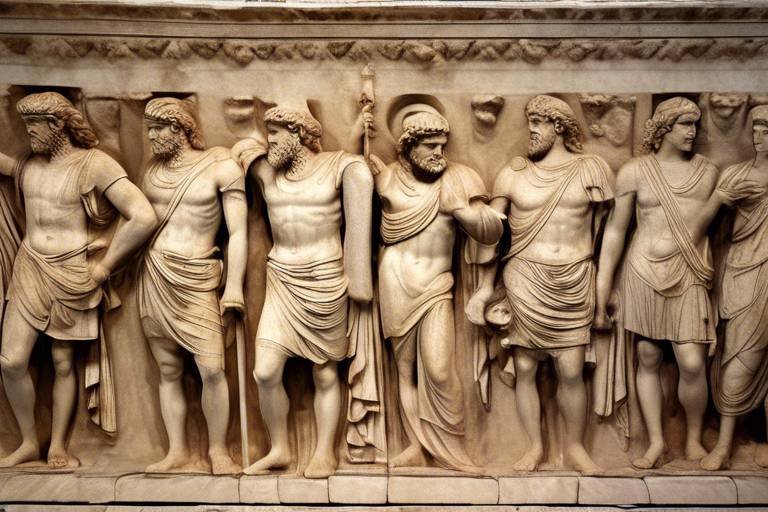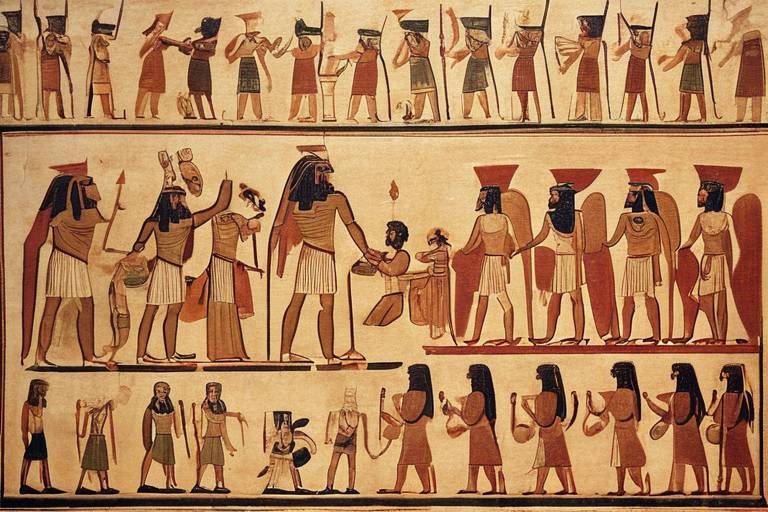The Enigma of the Lost City of Ephesus
The ancient city of Ephesus stands as a testament to the enigmatic mysteries of the past, shrouded in historical significance and grandeur. Once a thriving hub of civilization, Ephesus captivates the imagination with its intriguing tale of rise and fall, leaving behind a legacy that continues to intrigue historians and archaeologists alike.
Stepping back in time, Ephesus emerges as a Greek settlement that flourished into a prominent Roman city, boasting impressive architectural marvels that reflected the prosperity and cultural richness of its inhabitants. The city's evolution over the centuries witnessed a transformation that left behind a legacy of grand structures and monuments that defined its identity.
Among the architectural wonders that graced Ephesus, the Temple of Artemis, one of the Seven Wonders of the Ancient World, stood as a symbol of religious devotion and artistic excellence. The Library of Celsus, a testament to intellectual pursuits, and the Great Theatre, a venue for entertainment and civic gatherings, showcased the diverse facets of life in Ephesus.
Religiously significant, Ephesus served as a center of worship for the goddess Artemis, attracting pilgrims and devotees from far and wide. Its association with early Christian history, including the presence of St. Paul and the establishment of Christian communities, added layers of spiritual importance to the city's narrative.
However, the enigma of Ephesus lies in its mysterious decline from prominence, a puzzle that continues to intrigue scholars. Factors such as shifting trade routes, natural calamities, and the rise of other cities in the region contributed to Ephesus' gradual fade into obscurity, leaving behind a legacy of unanswered questions and untold stories.
Modern-day explorations through archaeological excavations have unearthed captivating discoveries that offer glimpses into the daily life of ancient Ephesus. The bustling streets, vibrant markets, and diverse population paint a vivid picture of a city teeming with activity and cultural exchange, providing a window into the past that sparks curiosity and wonder.
Today, Ephesus stands as a UNESCO World Heritage Site, drawing visitors from across the globe to marvel at its ancient ruins and immerse themselves in its rich history. Efforts to preserve and protect the legacy of Ephesus ensure that future generations can continue to unravel the enigmatic tale of this lost city, keeping its mysteries alive for years to come.

Historical Background of Ephesus
The historical background of Ephesus is a tapestry woven with threads of Greek and Roman influence, creating a vibrant and diverse city that stood as a testament to ancient civilization. Founded by the Greeks in the 10th century BC, Ephesus evolved into a prominent Roman city in the 1st century BC, becoming a bustling hub of trade, culture, and religious significance. The city's strategic location on the Aegean coast facilitated its growth and prosperity, attracting merchants, artisans, and travelers from far and wide.
As Ephesus flourished under Roman rule, it became a center of learning and innovation, boasting grand architecture, sophisticated infrastructure, and a thriving economy. The city's prosperity was reflected in its magnificent structures, such as the Temple of Artemis, one of the Seven Wonders of the Ancient World, and the Library of Celsus, a symbol of intellectual achievement and cultural richness.
However, the fortunes of Ephesus began to wane in the 3rd century AD, as changing trade routes and political upheavals led to a gradual decline in its prominence. The city faced challenges from invading forces, natural disasters, and internal strife, which ultimately contributed to its gradual abandonment and obscurity in the annals of history.
Despite its eventual decline, Ephesus left an indelible mark on the ancient world, influencing art, architecture, and religion for centuries to come. The legacy of this enigmatic city continues to intrigue historians, archaeologists, and travelers alike, offering a glimpse into a bygone era of splendor and sophistication.

Architectural Marvels of Ephesus
When it comes to architectural marvels, Ephesus stands out as a true gem of the ancient world. The city was adorned with magnificent structures that showcased the skill and grandeur of its builders. One of the most iconic landmarks in Ephesus was the Temple of Artemis, one of the Seven Wonders of the Ancient World. This colossal temple dedicated to the goddess Artemis was a sight to behold, with its towering columns and intricate carvings.
Another architectural wonder that graced the streets of Ephesus was the Library of Celsus. This impressive library was a testament to the intellectual richness of the city, housing thousands of scrolls and serving as a center of learning and scholarship. The facade of the library, adorned with statues and reliefs, was a masterpiece of ancient architecture.
One cannot talk about Ephesus without mentioning the Great Theatre, a massive amphitheater that could seat thousands of spectators. This grand structure hosted theatrical performances, gladiatorial contests, and public gatherings, showcasing the cultural vibrancy of the city.
The Terrace Houses of Ephesus also deserve a mention, as these luxurious residences provide a glimpse into the opulent lifestyle of the city's elite. Elaborate frescoes, intricate mosaics, and sophisticated heating systems adorned these houses, reflecting the wealth and sophistication of Ephesus.

Religious Significance of Ephesus
The religious significance of Ephesus holds a profound historical importance that reverberates through the ages. At the heart of Ephesus stood the Temple of Artemis, one of the Seven Wonders of the Ancient World. This grand structure dedicated to the goddess of fertility attracted pilgrims from far and wide, contributing to the city's reputation as a religious center.
Moreover, Ephesus played a pivotal role in early Christian history. It was in this ancient city that St. Paul preached to the Ephesians, leaving a lasting impact on the spread of Christianity. The presence of the House of the Virgin Mary nearby further solidifies Ephesus's significance as a place of spiritual devotion and pilgrimage.
The religious tapestry of Ephesus was woven with threads of mythology and faith, creating a vibrant mosaic of beliefs that shaped the city's cultural landscape. The cult of Artemis, with its rituals and ceremonies, intertwined with the emerging Christian community, creating a unique blend of traditions that defined Ephesus as a sacred sanctuary.

The Mystery of Ephesus' Decline
One of the most intriguing aspects of Ephesus' history is the enigmatic decline that led to its eventual disappearance from prominence in the ancient world. Scholars and archaeologists have long debated the factors that contributed to the downfall of this once-thriving city, leaving behind a mystery that continues to captivate the imagination of historians and enthusiasts alike.
One of the key factors believed to have played a role in Ephesus' decline was the shifting of trade routes in the region. As trade patterns changed and new routes emerged, Ephesus found itself losing its strategic position as a major commercial hub. This economic decline likely had a cascading effect on the city's prosperity and influence, leading to its gradual decline.
Natural disasters also took their toll on Ephesus, with earthquakes and floods causing significant damage to the city over the centuries. These catastrophic events not only destroyed important infrastructure but also disrupted daily life and economic activities, further weakening the city's resilience and ability to recover.
Furthermore, as power dynamics shifted in the ancient world, other cities in the region began to rise in prominence, drawing attention and resources away from Ephesus. The emergence of new political centers and cultural hubs diminished Ephesus' significance, ultimately contributing to its gradual decline and eventual obscurity.
Despite ongoing archaeological excavations and research efforts, the precise reasons behind Ephesus' mysterious decline remain a subject of speculation and debate. The combination of economic, environmental, and geopolitical factors likely played a role in shaping the fate of this once-great city, leaving behind a legacy shrouded in enigma and intrigue.

Excavations and Discoveries at Ephesus
Excavations at Ephesus have unearthed a treasure trove of historical artifacts and insights into the ancient city's past. Archaeologists have meticulously excavated various sites within Ephesus, revealing a complex urban landscape that once thrived with life and activity. The discoveries made during these excavations have provided valuable clues about the city's architecture, daily life, and religious practices.
One of the most significant discoveries at Ephesus is the grand Library of Celsus, a stunning example of Roman architecture that once housed thousands of scrolls and served as a symbol of knowledge and learning. The meticulous restoration of the library has allowed visitors to marvel at its intricate facade and imagine the scholarly pursuits that once took place within its walls.
Excavations have also uncovered the remains of the Temple of Artemis, one of the Seven Wonders of the Ancient World. Although largely destroyed over the centuries, the foundations and fragments of this magnificent temple offer a glimpse into the religious fervor and architectural prowess of the ancient Ephesians.
Furthermore, ongoing excavations have revealed intricate mosaics, well-preserved frescoes, and everyday objects that provide a glimpse into the daily lives of Ephesus' inhabitants. From luxurious villas to bustling marketplaces, these discoveries paint a vivid picture of the city's vibrant past and cultural richness.
Archaeologists continue to unearth new findings at Ephesus, piecing together the puzzle of this enigmatic city's history and unraveling its mysteries. Each discovery brings us closer to understanding the rise, glory, and eventual decline of Ephesus, shedding light on the factors that shaped its fate and allure.

Life in Ancient Ephesus
Life in ancient Ephesus was a vibrant tapestry of bustling streets, lively markets, and a diverse population that made the city a melting pot of cultures and traditions. The streets of Ephesus were filled with the sounds of merchants hawking their wares, the chatter of locals going about their daily routines, and the laughter of children playing in the narrow alleyways.
One of the defining features of ancient Ephesus was its impressive infrastructure, with well-paved streets, public baths, and ornate fountains adorning the city. The Ephesians took great pride in their city, evident in the meticulous planning and maintenance of its public spaces.
The markets of Ephesus were a hub of activity, where traders from far and wide converged to sell their goods. Spices, textiles, pottery, and exotic goods from distant lands filled the stalls, creating a sensory feast for visitors and residents alike.
The population of Ephesus was a cosmopolitan mix of Greeks, Romans, Jews, and other ethnic groups, each contributing to the city's rich tapestry of culture and traditions. The city was known for its tolerance and acceptance of diverse beliefs, making it a haven for those seeking refuge and opportunity.
Religion played a significant role in the daily life of Ephesus, with the Temple of Artemis standing as a prominent symbol of worship. The cult of Artemis was deeply ingrained in the city's identity, drawing pilgrims from far and wide to pay homage to the goddess of fertility and nature.
Despite its grandeur and prosperity, life in ancient Ephesus was not without its challenges. The city faced threats from invading forces, political unrest, and economic fluctuations that tested the resilience of its inhabitants. Yet, through it all, the spirit of Ephesus endured, leaving behind a legacy that continues to fascinate and inspire generations to come.

Ephesus in Modern Times
Ephesus, once a thriving ancient city with a rich history and grand architecture, continues to captivate visitors in modern times. As a designated UNESCO World Heritage Site, Ephesus stands as a testament to the enduring legacy of the past, attracting tourists from all corners of the globe. The well-preserved ruins and archaeological sites offer a glimpse into the city's former glory, allowing visitors to walk in the footsteps of ancient civilizations.
Modern-day Ephesus serves as a melting pot of cultures and histories, where the echoes of the past resonate through the cobblestone streets and towering monuments. Tourists flock to marvel at the Library of Celsus, the Great Theatre, and the Temple of Artemis, immersing themselves in the timeless beauty of these architectural marvels.
Visiting Ephesus today is akin to embarking on a journey through time, where the stories of ancient civilizations come to life amidst the ruins and relics of a bygone era. The city's allure lies not only in its historical significance but also in the mystery that shrouds its enigmatic disappearance from prominence in the ancient world.
As efforts to preserve and protect Ephesus for future generations continue, the modern-day significance of this ancient city remains unwavering. The site serves as a living museum, where the past meets the present, inviting visitors to unravel the mysteries of Ephesus and experience the magic of history firsthand.

Preserving the Legacy of Ephesus
Preserving the Legacy of Ephesus is a monumental task that requires dedication and meticulous care. Efforts to safeguard this ancient city's heritage involve a combination of conservation, restoration, and education initiatives. Archaeologists and historians work tirelessly to protect the ruins and artifacts that offer glimpses into Ephesus' past.
One of the key strategies in preserving Ephesus is the implementation of strict guidelines for visitors. Through controlled access and guided tours, the impact of tourism on the fragile remains is minimized. Additionally, ongoing research helps to uncover new insights into the city's history, informing conservation efforts and enhancing the visitor experience.
Conservation projects focus on stabilizing structures, preventing further deterioration, and restoring key monuments to their former glory. By using advanced techniques and materials, experts aim to ensure that future generations can continue to marvel at Ephesus' architectural wonders.
Education plays a crucial role in preserving Ephesus' legacy. Through outreach programs, workshops, and exhibitions, the public is engaged in learning about the significance of the site and the importance of protecting it for the future. By raising awareness and fostering a sense of stewardship, efforts to preserve Ephesus are strengthened.
Frequently Asked Questions
- What is the significance of Ephesus in history?
Ephesus holds immense historical significance as an ancient Greek and Roman city that was once a major center of trade, culture, and religion in the ancient world. It was renowned for its architectural marvels, religious importance, and strategic location.
- What are some notable architectural structures in Ephesus?
Ephesus boasts impressive architectural structures such as the Temple of Artemis, one of the Seven Wonders of the Ancient World, the Library of Celsus, the Great Theatre, and the Terrace Houses, showcasing the city's grandeur and craftsmanship.
- Why did Ephesus decline in prominence?
The decline of Ephesus can be attributed to various factors including changes in trade routes, natural disasters like earthquakes and floods, the rise of other cities in the region, and the eventual abandonment of the city due to economic and political shifts.
- What can visitors expect to see at the archaeological site of Ephesus?
Visitors to Ephesus can explore well-preserved ruins of ancient streets, houses, theaters, and public buildings, gaining insights into the daily life, culture, and architectural achievements of the inhabitants of this once-thriving city.
- How is the legacy of Ephesus being preserved for future generations?
Efforts are underway to protect and conserve the archaeological site of Ephesus through restoration projects, conservation programs, and educational initiatives, ensuring that its enigmatic history and cultural heritage endure for generations to come.



















